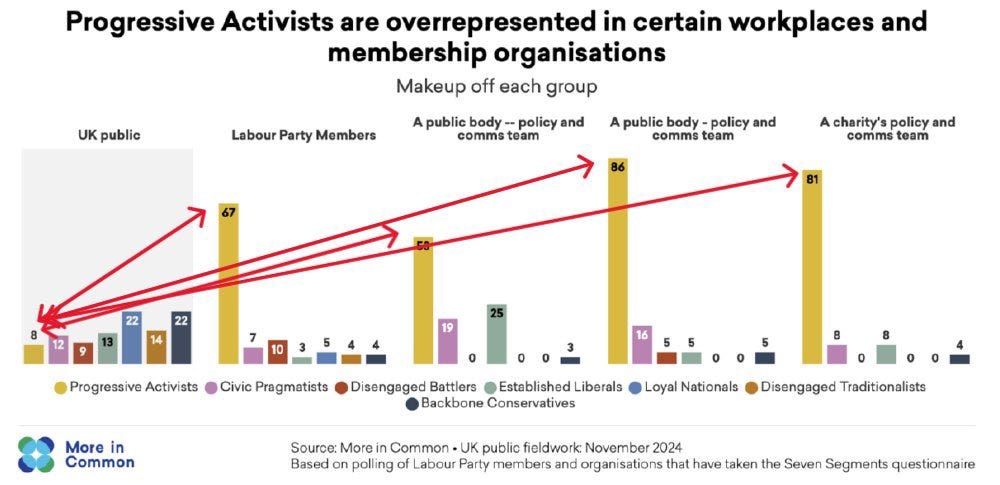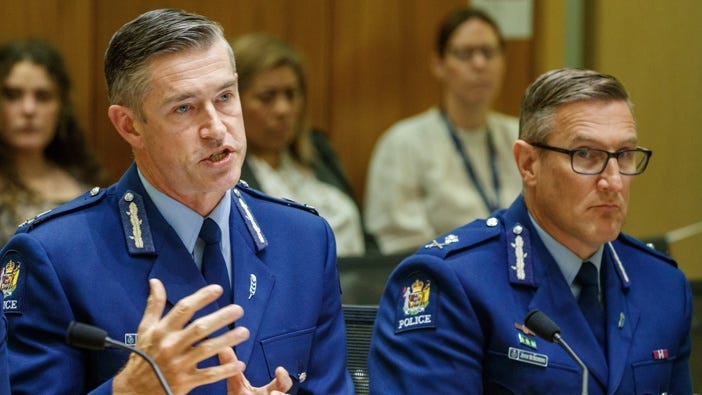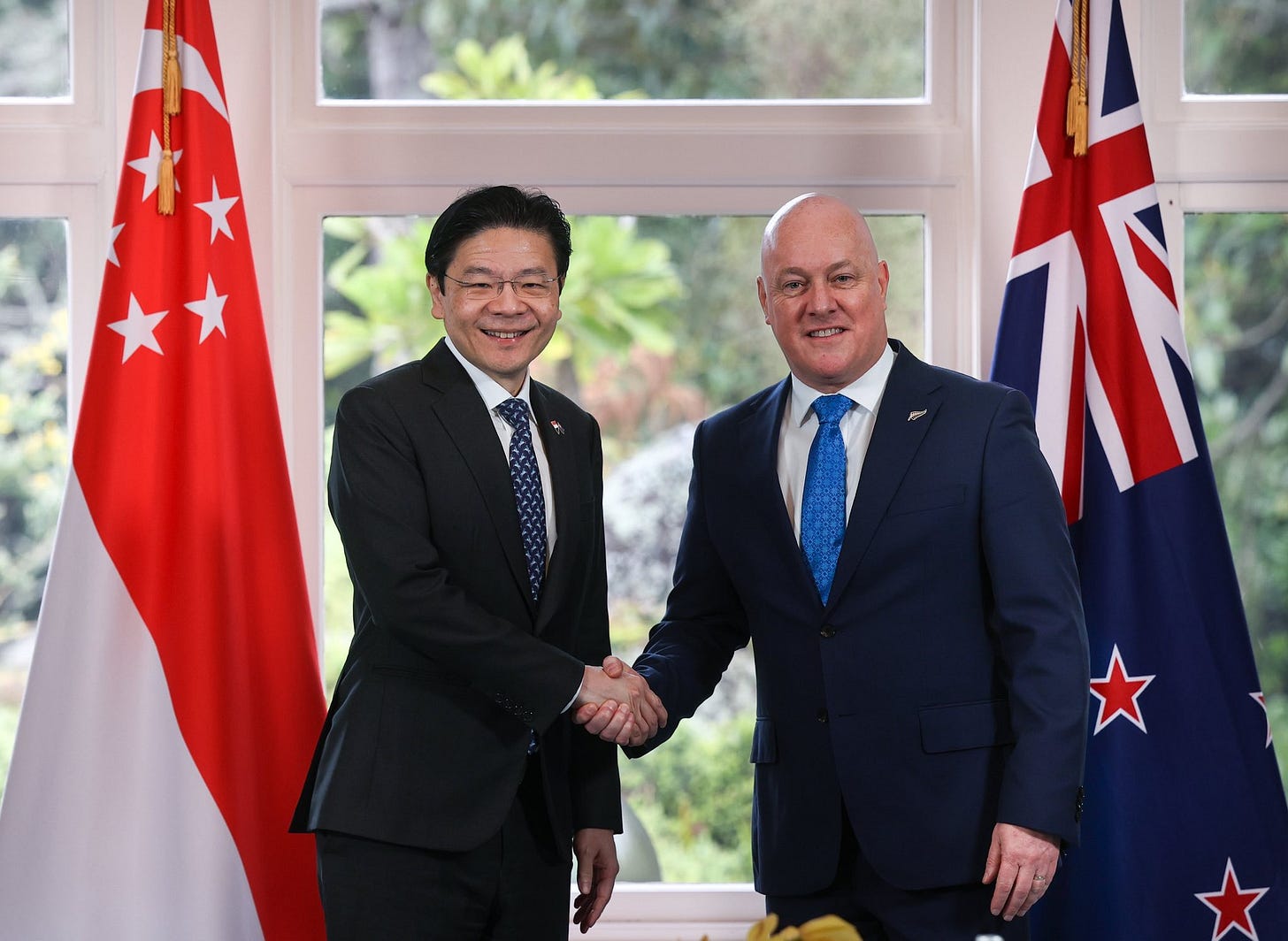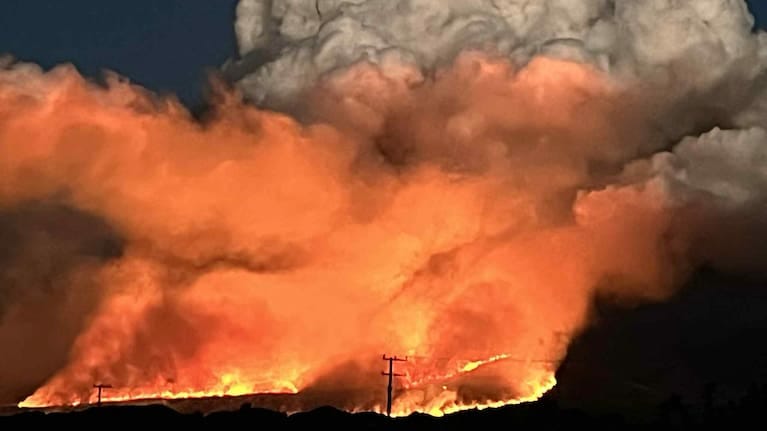A week is a long time in politics. Welcome to my weekly wrap up of the week that was in New Zealand politics with a sprinkling of international news.
The McSkimming Scandal: a system rotting from the top
The bombshell IPCA report into former Deputy Police Commissioner Jevon McSkimming has unearthed a culture problem in the NZ Police that goes far beyond just one creepy bad apple. One of the country’s most senior officers was shielded for years while a young woman was prosecuted under the Harmful Digital Communications Act for daring to report allegations against him.
McSkimming’s friends and colleagues closed ranks and the institution turned its considerable power on a clearly highly-distressed woman. It’s corruption. Not in the sense that bags of cash are being dropped into idling vans, but in that it is power protecting itself.
The IPCA has exposed systemic failures in how complaints against senior officers are handled, how whistle-blowers are treated, and how the HDCA, supposedly designed to protect victims of online abuse, was weaponised to silence one. Public Service Minister Judith Collins has announced that an Inspector-General will be appointed to sit over the top of NZ Police, and Police Minister Mark Mitchell and Police Commissioner Richard Chambers have expressed horror and determination to rebuild trust.
The public deserves better than a police force that prosecutes victims and promotes perpetrators. I have written extensive pieces on the IPCA report - Part One - and - Part Two. And I intend to write more about the implications later.
The public deserves better than a police force that prosecutes victims and promotes perpetrators. I have written extensive pieces on the IPCA report - Part One - and - Part Two. And I intend to write more about the implications later.
Te Pāti Māori splits down the middle
The chaotic implosion of Te Pāti Māori has now reached full flamethrower mode. This week, the party’s national council voted to expel MPs Mariameno Kapa‑Kingi and Tākuta Ferris reducing the caucus from six to four. Both Kapa-Kingi and Ferris are now independent MPs, albeit still claiming the Māori-voice mantle, and both say the expulsion was “a joke” and “plainly unconstitutional.”
But it gets messier. The expelled duo aren’t taking it lying down. They held a meeting, without co-leaders Debbie Ngārewa‑Packer and Rawiri Waititi, but with Oriini Kaipara and a representative of Hana‑Rāwhiti Maipi‑Clarke. In other words, the remaining third of the caucus may not yet be out of the party, but certainly are drifting out of the leadership’s control. By showing up at a meeting with the expelled pair, Kaipara has shown she has at least got a foot in each camp.
Ferris accuses the leadership of behaving “way below the line” and of turning the party into a trap for MPs who don’t toe the line. Party president John Tamihere, meanwhile, claims Ferris and Kapa-Kingi had attempted a leadership coup. Whether that’s true or a convenient narrative, it doesn’t change the fact the damage is done.
The weeks ahead will show whether this is the end for Te Pāti Māori, the birth of a new party, or merely the wobble before a reset, but the smoke is billowing.
🇬🇧 The BBC finally implodes under the weight of its own woke hypocrisy
About time. The BBC’s epic meltdown feels significant. It doesn’t feel like a simple media hiccup. It looks tantalisingly like vindication for the women who have been sounding alarms about gender ideology, editorial bias and the suppression of women’s voices for years.
The scandal started with the broadcaster’s flagship Panorama documentary, which splice-edited Donald Trump’s 6 January 2021 speech to make it appear he directly incited the US Capitol riot when in reality the clips were pulled from separate parts of the speech (some 50 minutes apart). Director-General Tim Davie and News CEO Deborah Turness’ careers have become collateral damage with the pair resigning amid accusations of “serious and systemic” bias. The resignations are a tacit admission by one of the world’s most influential news organisations that credibility, impartiality and honesty were compromised.
But this isn’t just about disingenuous editing of one speech. A leaked memo from former standards adviser Michael Prescott lays out how the BBC purportedly mishandled coverage of trans rights, treated women’s issues through the lens of a gender-activist orthodoxy, and skewed reporting of the Israel–Gaza conflict. This included serious discrepancies in the coverage of the October 7 2023 Hamas attack.
Asbestos in Kids’ Sand Products
Nearly 60 schools and early-childhood centres around the country have flagged they used coloured rainbow sand products which have now been recalled because they may contain the naturally-occurring asbestos mineral tremolite. The recall affects brands like Educational Colours Rainbow Sand and Creatistics Coloured Sand. The Ministry of Education has instructed schools not to attempt clean-up but to isolate the product and check the WorkSafe website for safe disposal assistance.
The sand was sold at Paper Plus, Hobby Land, NZ School Shop, Office Products Depot, Discount Office, Acquire, and Qizzle, Modern Teaching Aids, Creative Classrooms Ltd and ACME Supplies. MBIE say it may have also been sold online.
Luxon talks asset recycling, Hipkins screams “privatisation!”
Christopher Luxon has been doing the political tightrope act this week. He is clear that he is keeping his promise that there will be no state-asset sales this term, but also opening the door to what he calls a “mature conversation” about them before the next election. He says the Government needs to look at whether it makes sense to hold onto every Crown-owned business forever, or whether some assets could be sold and the money reinvested in infrastructure or higher-performing ventures. Asset recycling, he argues, is not a fire sale; it’s meant to “recycle” capital from mature assets into projects that deliver higher public value.
Unsurprisingly, the Opposition went on the attack. Chris Hipkins accused Luxon of planning to “sell off the family silver” and the Public Service Association chimed in, taking an issue with the term “asset recycling” saying it is a PR term for privatisation and vowing to fight it.
Supporters of the idea, though, argue that it’s just smart balance-sheet management. Treasury has repeatedly said that parts of the Crown’s commercial portfolio are under-performing, and Luxon sees no reason for the state to be the permanent owner of every enterprise. He points to Singapore which is often held up as the gold-standard example. Through its sovereign wealth funds Temasek Holdings and GIC the government has effectively recycled assets for decades, selling stakes in mature state-owned companies (like Singtel and Singapore Airlines) and reinvesting the returns into housing, transport, and new technology sectors.
Are we capable of the “mature conversation”?
🏴 Scotland rediscovers biology and that rapists are male after all
Hemingway famously wrote that bankruptcy happens “gradually, then suddenly”. As the BBC has its reckoning with ideological reporting, Scotland is having its own moment of sanity and returning to the obvious position that when a person armed with a penis commits rape, the data and the public record should reflect it was a male perpetrator. This follows years of confusion where, under gender‐self-identification ideological madness men who “identified as women” were being logged as female offenders even for sexual crimes.
This reset of institutional honesty came via a petition from research group Murray Blackburn Mackenzie (MBM) demanding accurate recording of sex in rape statistics.
In an overdue intervention, Chief Constable Jo Farrell made it clear: “A man who commits rape is, should be, and will be recorded … as a male.”
The least of Police’s problems: Chambers’ heavy foot
In any normal week, the Police Commissioner being pulled over for speeding would be notable. But this isn’t a normal week for New Zealand Police and Richard Chambers doing 112 km/h on State Highway 2 barely registers on the scandal scale. Compared to the McSkimming corruption saga and the IPCA’s devastating report into senior-level misconduct, a momentary lapse behind the wheel looks almost quaint.
And to be fair, Chambers owned it. No excuses, no obfuscation, no PR spin. He called it “the dumbest thing I’ve done” and accepted the ticket like any other driver. In a week when the country’s seen just how deeply integrity failures can run in the force, it’s oddly refreshing to see the most senior officer take responsibility instead of hiding behind legalese or internal process.
Tongariro burns and out come the spiritual woowoo hot takes
The fire that tore through Tongariro National Park this week destroyed nearly 3,000 hectares of native bush and alpine habitat. it was one of the worst burns in recent memory. A rāhui has been placed over the area while the land recovers, which makes complete sense. We should stop people trampling through a charred national park while the environment stabilises. Fine. Practical. Sensible. But there was confusion when suddenly there was talk of a decade long rāhui and DOC didn’t seem to know what to do.
Then along came Te Pāti Māori MP Oriini Kaipara, deciding it was a “message from beyond the grave”. She suggested the blaze might have been sent by the late chief Tā Tumu Te Heuheu Tūkino VIII as a spiritual warning about land ownership and the Crown’s relationship with the mountain. Really? A natural disaster framed as a ghostly protest message?
Anyway, she concluded the chief was telling the Crown to handover Tongariro to Māori. A novel approach to Māori-Crown relations.
Breakers opt out of rainbow round
This week the New Zealand Breakers basketball team announced they will not wear the rainbow-progress flag patch as part of the National Basketball League (Australia)’s upcoming Pride Round. They say it was a collective decision. That either the entire team wears it or none do and some players raised religious or cultural objections.
This is an interesting case as it is a stand for individual conscience which is protected under the Bill of Rights Act. In section 13 it says: “the right to freedom of thought, conscience, religion, and belief, including the right to adopt and hold opinions without interference.”
What makes it more interesting is that the Breakers have just opted out together. In a world where athletes are increasingly pressured to tick every “diversity box” and they are punished via loss of sponsorship or even their place on the team for holding the “wrong” politics, the club’s approach preserves internal unity rather than forcing a public gesture that might divide the squad. They reiterated they remain committed to being “safe, welcoming and inclusive” for all players, but drew a line when it came to uniform symbolism.
Another Labour promise that sounds good on paper
Labour is promising that from October 2027 anyone eligible for cervical screening will be able to access it for free, via its proposed Medicard scheme. But the policy glosses over the fact that free screening for everyone isn’t new. Many at-risk groups already receive it at no cost. Currently, screening is already free for Māori and Pacific people, those holding a Community Services Card, and older people who are overdue or never screened. So what’s really being sold here is the removal of the fee for the remaining, lower-risk group, not a vast opening up of access.
As the research centre Te Tātai Hauora o Hine pointed out, the barrier for many isn’t the out-of-pocket fee so much as access, awareness, and a reluctance in Māori and Pacific communities.
Thanks to the HPV vaccination and regular screening, cases have more than halved since 1990, from 13.9 to 6.7 per 100,000 women, and deaths have dropped even further, from 5.5 to 1.7. That’s real progress, but we’re still seeing around 171 new diagnoses and 53 deaths every year. However, to put that in perspective, cervical cancer kills far fewer women than breast cancer (which causes around 700 deaths a year) or bowel cancer (over 1,200 deaths annually), yet it’s the one we have the best tools to eliminate entirely.
Notably Labour don’t appear to have a plan for the around 4,000 men who are diagnosed each year with prostate cancer. About 700 die from it annually; that’s roughly 13 times more deaths than from cervical cancer. Unlike cervical cancer, there’s no national screening programme for prostate cancer.
🇫🇷 Ten years since the Bataclan and still no lessons learned
Ten years ago, Islamic terrorists stormed the Bataclan concert hall in Paris, slaughtering 90 innocent people and injuring hundreds more in a coordinated night of terror that also struck bars, cafés, and the Stade de France. It was one of the darkest days in modern European history. A massacre carried out in the name of jihad in the heart of a Western capital. France vowed never to forget. But this week’s commemorations showed how fragile that vow has become.
As survivors and families gathered to honour the victims, pro-Palestinian activists staged demonstrations across France, some drawing attention away from remembrance and, in a few cases, outright disrespecting the victims of Islamist terror. Whatever one thinks about Israel and Palestine, the anniversary of a jihadist atrocity is not the time or place to justify or minimise the ideology that drove it.
France has spent a decade promising vigilance, but it still struggles to confront the cultural and religious ideologies that make attacks like Bataclan possible. And when even remembrance becomes politicised, you start to wonder whether Europe has truly learned anything at all.
Can Luxon’s Government actually break the bank cartel?
The government has formally accepted or partially accepted the 19 recommendations stemming from the cross-party inquiry and the Commerce Commission’s market study, aimed at shaking up the banking sector. Key moves include giving Kiwibank’s parent company the green light to raise extra capital, directing the Reserve Bank of New Zealand (RBNZ) to place a stronger emphasis on competition in prudential policy, and encouraging banks to standardise financial-product data to help consumers compare loans more easily. The reforms also include specific steps to reduce barriers for Māori land trusts and support co-investment in infrastructure.
That said, the implementation will be what counts. While the frameworks are now in place, many of the promised benefits like greater product choice, lower fees, stronger challenger banks, are still future-oriented. And though Kiwibank’s capital boost presents a potential competitive disruptor, it remains to be seen whether that will translate into meaningful pressure on the dominant banks. On the regulatory front, the RBNZ appears supportive, noting alignment with some of these goals, but cautioning that reforms must balance stability with competition.
The reforms represent a credible step forward. For the first time in some years the government appears to be treating banking competition as a policy priority rather than something to fiddle around the edges.
Amid opposition drama and implosions, Government gets s*** done
The government cleared four major bills this week, pressing ahead with its agenda even as political theatrics swirled around Parliament. Two of the bills sailed through with broad consensus; the other two exposed clear fault-lines between the coalition and opposition.
One of the standout bills was the Medicines Amendment Bill, which aims to speed up access to medicines by introducing a “rule of two” where if a drug is approved in two approved overseas jurisdictions, New Zealand will fast-track it. This change has private and public-health wings both in support.
At the same time, the Regulatory Standards Bill cleared its final reading, ushering in new frameworks for how laws are made and reviewed. While the coalition celebrates it as improving transparency and regulatory discipline, critics say it tilts towards big-business interests and marginalises Treaty obligations.
The two other bills passed this week were the Education and Training Amendment Bill (No. 2) which refocuses the education system around achievement and the Land Transport Management Amendment Bill (also known as the congestion-charging bill), aimed at reforming how transport projects are funded and managed.
Chart of the week

Click to view
In short - other stuff that happened:
- Having fronted Breakfast since 2020, Jenny-May Clarkson is leaving TVNZ at the end of the year, citing a need to “reset and refocus.”
- The owners of the Wimbledon Tavern in Tararua have closed up shop, blaming “evil locals” for harassment, vandalism, and abuse.
- Nathan Boulter who was convicted of a high-profile Great Barrier Island kidnapping case from 2010 has now been jailed for the brutal stabbing murder of a woman following him being paroled.
- An NCEA English exam asked students to write about a long-haired boy being bullied and forced to pull his pants down, prompting complaints from parents and teachers. NZQA has apologised, calling the content “inappropriate.”
- A major legal battle over Auckland’s Westhaven Marina is underway, as Ngāti Whātua Ōrākei fights to uphold its mana whenua claim against rival iwi. The case could reshape Treaty-based property rights in urban settings.
- Kiwi heavyweight Joseph Parker has failed a drug test, putting his upcoming fight and possibly his career in jeopardy. Representatives of Parker say he is “shocked”.
- 🇮🇹 Milan prosecutors have launched a chilling probe into alleged “sniper tourism” during the 1992-96 siege of Sarajevo, where wealthy foreigners reportedly paid Bosnian Serb forces to shoot civilians, including children, for sport.
- Rocket Lab has launched two “Esca PADE” spacecraft, designed and built with key components in Auckland, which are now on a path to Mars under a NASA-UCB mission.
- Police are set to roll out a new roadside drug-testing device that uses a quick oral-fluid “tongue-swipe” to detect four key drugs, THC (cannabis), cocaine, methamphetamine and MDMA, starting next month in Wellington and expanding nationwide by mid-2026.
- A new bill to expand road-user charges, and likely to include hybrid and electric vehicles, has been introduced to Parliament.
“In a now-viral 2020 email, the Silicon Valley billionaire predicted the rise of socialism. Today he tells The Free Press how he knew…”
Read more
Ani O'Brien comes from a digital marketing background, she has been heavily involved in women's rights advocacy and is a founding council member of the Free Speech Union. This article was originally published on Ani's Substack Site and is published here with kind permission.





 The Free Press
The Free Press
2 comments:
Years ago, before 'covid' I commented on line that an ex cop mate of mine had worked with Jacinda's dad. I wrote that my mate had said that he was a totally honest, likeable, dependable, trustworthy and honorable person (mormon?).
Some funny person respoinded to my post saying ' no wonder he left the police'.
I will comment no further with my views about his infamous daughter.
New Zealand Police IPCA McSkimmingate report | Look what's in the shadows? - (The Anglo Saxon)
https://www.youtube.com/watch?v=zm2_lBJYcjs&list=TLPQMTUxMTIwMjU0kQrdN0aazg&index=6
Post a Comment
Thank you for joining the discussion. Breaking Views welcomes respectful contributions that enrich the debate. Please ensure your comments are not defamatory, derogatory or disruptive. We appreciate your cooperation.